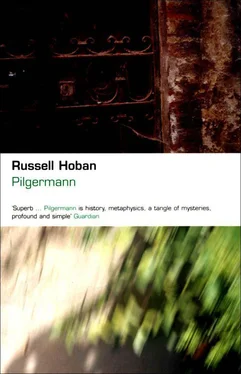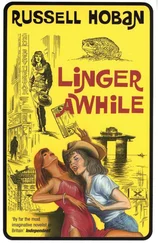Russell Hoban - Pilgermann
Здесь есть возможность читать онлайн «Russell Hoban - Pilgermann» весь текст электронной книги совершенно бесплатно (целиком полную версию без сокращений). В некоторых случаях можно слушать аудио, скачать через торрент в формате fb2 и присутствует краткое содержание. Год выпуска: 2002, Издательство: Bloomsbury Publishing PLC, Жанр: Современная проза, на английском языке. Описание произведения, (предисловие) а так же отзывы посетителей доступны на портале библиотеки ЛибКат.
- Название:Pilgermann
- Автор:
- Издательство:Bloomsbury Publishing PLC
- Жанр:
- Год:2002
- ISBN:нет данных
- Рейтинг книги:5 / 5. Голосов: 1
-
Избранное:Добавить в избранное
- Отзывы:
-
Ваша оценка:
- 100
- 1
- 2
- 3
- 4
- 5
Pilgermann: краткое содержание, описание и аннотация
Предлагаем к чтению аннотацию, описание, краткое содержание или предисловие (зависит от того, что написал сам автор книги «Pilgermann»). Если вы не нашли необходимую информацию о книге — напишите в комментариях, мы постараемся отыскать её.
Pilgermann — читать онлайн бесплатно полную книгу (весь текст) целиком
Ниже представлен текст книги, разбитый по страницам. Система сохранения места последней прочитанной страницы, позволяет с удобством читать онлайн бесплатно книгу «Pilgermann», без необходимости каждый раз заново искать на чём Вы остановились. Поставьте закладку, и сможете в любой момент перейти на страницу, на которой закончили чтение.
Интервал:
Закладка:
I said, ‘May it be that there is no necessity to study this pattern or observe it methodically? May it not even be inadvisable to do so? May it not be that the best way of conducting oneself with this pattern is simply to take it in without any thought and to enjoy in it the presence of the Unseen?’
‘I think you’re right,’ said Bembel Rudzuk.
So. Bembel Rudzuk went on writing the names of Allah on the undersides of the tiles and the workmen went on dancingly fitting them into the pattern. And what was my work at this time? I was a witness. I was there to see every tile fitted, I was there to see Hidden Lion grow triangle by triangle. I wrote down no observations, kept no record of its progress from day to day; I drained off none of the virtue of it; I gave my mind to it and there it lived and went its way.
All the time that the work of putting together Hidden Lion was going on we were watched daily by children, by idlers and street sages, by all manner of people pausing on the way from one place to another. The children soon began to walk on the pattern in special ways and to dance on it, sometimes stepping only on the red triangles, sometimes only on the black. Seeing them always out of the corner of my eye I found in my mind new and unwritten names of God: The Tiptoeing; The Sidewise-Jumping; The Hopping; The Leaping; The Dancing; The Whirling.
One morning the baker who had a shop near Hidden Lion came and stood respectfully before Bembel Rudzuk. ‘My lord,’ he said, ‘I have heard that this design came to you in a dream, that you were commanded by Allah to cover this square with this pattern, and that on the underside of each tile is written a name of Allah in all the tongues of mankind. Is this true?’
‘The design came to me in the mind of this pilgrim,’ said Bembel Rudzuk, indicating me. ‘Certainly it is by the will of Allah that we do this work, and it is true that there is written on the underside of each tile a name of Allah, but in Arabic only.’
‘This is virtuous action,’ said the baker, ‘and therefore one is not surprised that there is virtue in it. My son comes here to play in the evening, he does no harm, he only walks on the tiles. For three months he has had an infection of the right eye. Yesterday evening he walked from star to star on one line of stars for as far as the tiles went. Walking towards Mecca he trod only on the small red triangles and looked at them fixedly; walking back he trod only on the small black triangles and looked at them fixedly. This morning the eye infection is completely gone. I have no wish to intrude upon your good work but I ask in all humility that you take this small offering which is nothing really, it is only that something should pass from my hand to your hand in the name of Allah The Responsive, The Restorer.’ He put some money into the hand of Bembel Rudzuk.
‘Will you not rather give this money to the poor?’ said Bembel Rudzuk.
‘I give to the poor as well,’ said the baker. ‘This is something else, this is in praise of Allah whose attributes are infinite, Allah who has caused this idea to move you; it is only to show that I in my insignificant way am grateful.’
‘So be it,’ said Bembel Rudzuk. ‘The pattern is abstract; let the money also be used abstractly. I shall put it into one of the tiles of the pattern where it will be united with the design on the pattern and with the names of Allah in celebration of your gratitude to Him The Responsive, Him The Restorer.’
Bembel Rudzuk instructed a workman to chip out of the two-inch thickness of one of the tiles a shallow recess in the bottom; the money was mortared into the tile and the tile, inscribed with the desired names of Allah, was put into Hidden Lion.
On the next day came the potter whose shop was in the same street as that of the baker. ‘In the five years of our marriage,’ he said to Bembel Rudzuk, ‘my wife had not been able to conceive. At the end of the first day’s work after the building of the tower she came here and stepped on every tile that was in the pattern, saying while she did so the names of Allah. For seven evenings she came here and did this. Now is her womb quickened with life. I beg that this wholly inadequate offering be incorporated in one of your tiles dedicated to Allah, The Generous One.’
Bembel Rudzuk sighed. ‘Having accepted the money of the baker I cannot refuse yours,’ he said. ‘I shall do with it as you request.’
‘Wonderful are the ways of Allah!’ said Bembel Rudzuk after the potter had gone. ‘For such a little time was Hidden Lion permitted to go its uncorrupted way! Yesterday I did a foolish thing and today I am forced to continue in my foolishness. Already is the integrity of the work marred physically and spiritually. Two of the tiles have been mutilated for this primitive good-luck commerce and now there will be no end to it. Yesterday the Imam scowled at me; today he will laugh: I have become a vendor of good-luck charms.’
‘Then don’t let them give you any more money,’ I said.
‘Too late,’ said Bembel Rudzuk. ‘I must go on as I have begun. Striving too hard after wisdom has made me a fool.’
The visits of the baker and the potter made us aware that Hidden Lion had a life of its own in those evening hours when we were not there. The pregnancy of the potter’s wife reminded me that it had not been days but weeks since the tiles had begun to cover the square. People had been walking on the tiles, dancing on them, kissing them, counting them, contemplating them, acting in various special ways upon them, doing whatever they were moved by the place, the pattern, and the desire of their hearts to do. In the days that followed it was not single visitors who came but several at once, then more and more who waited patiently to tell Bembel Rudzuk how their wishes had been gratified and to give him their offering large or small for the work.
The Imam and the Rabbi were often to be seen observing what was going on. Bembel Rudzuk was right: the Imam, although not actually laughing, was smiling broadly. The Rabbi had on his face a particularly Jewish look: the pensive look of a man who while smiling almost fondly at people who are being childish is at the same time well aware that these childish people may at any moment require his life of him.
Firouz, a few days after his instructions as to dress, horses, and weapons, was reminded by the Rabbi’s yellow turban and belt that I was not similarly distinguishable. He questioned me about this with some severity and I told him that as a eunuch I could not count myself a member of the Jewish congregation. He then asked the Rabbi if that was so. The Rabbi, buttoning me with his eye, said that it was so. I expected Firouz to say that exclusion from the congregation did not cancel my Jewish status in dhimma matters but he did not say that; he looked thoughtful and he never broached the subject again.
At this time the pattern was still expanding, it had not yet covered the whole square. Children, I noticed, were particularly fond of walking and dancing the shape of the unfinished edges. It became evident to me that the forward edge of a pattern’s visible expansion is attractive, it excites in people and in things a desire to shape themselves to it, to meet it and move with its advance. I speak of the forward edge of the pattern’s visible expansion because I had become more and more strongly aware that the visual manifestation of a pattern comes only after the pattern is already in existence and already infinite: the visible expansion is only a finite tracing of what, being infinite, cannot further expand.
It was at this time also that I noticed that Hidden Lion in its abstractness was capable of activating in my vision more than the serpents, pyramids, lions, and enclaves of apparent disorder that I have described: there rose up from the motion and consciousness of the pattern an apparition of Jerusalem, a phantom of place unseen. It was that Jerusalem of my ignorance, that inn-sign Jerusalem of coarse and vivid colour, the solid geometry of its forms tawny-stoned, golden-domed, purple-shadowed, the aerial geometry of its light and shade rising with the forms transparently upon the air over Hidden Lion. Sometimes it was there, sometimes not. I was uncertain of the meaning of this apparition; sometimes I thought one thing, sometimes another. Sometimes I tried to move my mind away from it.
Читать дальшеИнтервал:
Закладка:
Похожие книги на «Pilgermann»
Представляем Вашему вниманию похожие книги на «Pilgermann» списком для выбора. Мы отобрали схожую по названию и смыслу литературу в надежде предоставить читателям больше вариантов отыскать новые, интересные, ещё непрочитанные произведения.
Обсуждение, отзывы о книге «Pilgermann» и просто собственные мнения читателей. Оставьте ваши комментарии, напишите, что Вы думаете о произведении, его смысле или главных героях. Укажите что конкретно понравилось, а что нет, и почему Вы так считаете.












